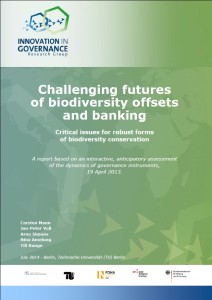“Challenging futures of biodiversity offsets and banking” was the name of a workshop that was held on 19 April 2013 in Berlin. The workshop was organized by the ‘Innovation in Governance Research Group’ Berlin as part of its research on the emergence, development and spread of new forms of governance.
The team applied a scenario-based approach to engage the participants in a dialogue about biodiversity offsets and habitat banking in the context of governance and principles of sustainable development. As a result, 24 invited experts gathered for a lively discussion (I took part in this discussion). The report of this event is now publicly available. Thanks to Carsten Mann and his team.
I have extracted some main points from the summary of the report below.
You can find the Agenda here: Challenging futures of biodiversity offsets and banking Agenda
To access the workshop report directly on the website of the Innovation in Governance Research Group, please go to: http://www.innovation-in-governance.org/fileadmin/user_upload/Publications/Biodiversity_offsets_banking_challenging_futures_report_final.pdf
Furthermore, I have also uploaded a pdf here: Challenging futures of biodiversity offsets and banking Workshop report
Summary of the report
This report emerged from the workshop “Challenging futures of biodiversity offsets and banking”, held by the Innovation in Governance Research Group on April 19, 2013, at the Berlin-Brandenburg Academy of Sciences and Humanities in Berlin, Germany. The workshop was conceptualized and designed as a platform for a wide variety of actors who regularly deal with the design and implementation of biodiversity conservation, offset, and banking schemes in order to identify and discuss issues and challenges for the future development of governance approaches for biodiversity conservation.
The workshop panel brought together diverse practitioners and scholars involved in the development of biodiversity offsets and credit trading as an innovation in governance. Their engagement with these policy instruments is connected to particular interests in the design and use of such new governance approaches: from scientific and methodological perspectives to political views that emphasize public responsibility in facing biodiversity loss and, finally, business interests in establishing market and service infrastructures.
Even though they shared a common interest in dealing with biodiversity offsetting and banking schemes, the participants held different views of the ‘nature’ of nature and biodiversity, how to determine their value, and whether market-based approaches can be suitable for the governance of biodiversity conservation.
Some of the views were more optimistic, others more critical as regards the prospects of biodiversity offsetting and banking. In bringing these distinct perspectives together in a focused process, the workshop stimulated a critical discussion and facilitated debates about the future and its challenges for the use and design of biodiversity offset and banking approaches.
[…]
One basic finding from the workshop was that while the design of biodiversity offset approaches and biodiversity valuation methods is often framed as functional-methodological issues, it is almost always linked with more fundamental and potentially antagonistic philosophies, worldviews and rationalities of how to see, use and value nature. The methodology, design and implementation of biodiversity offset and banking schemes is thus as much a political as a technical issue, a matter of concern and judgment, fact and functionality.
[…]
The main part of this report summarizes the issues and challenges discussed by workshop participants in relation to the future development of biodiversity offsetting and banking. These issues cover a range of topics. The workshop participants discussed questions about the functions and suitability of biodiversity offset schemes for halting biodiversity loss, and the contribution of such tools to conservation strategies and land-use planning procedures. Participants debated the value of biodiversity and ecosystems, along with the need for more holistic and participatory valuation methods that go beyond simple measurements in physical and economic terms. These topics were related to basic questions about the desirability and long-term impacts of monetarizing and permitting the commodification of nature and biodiversity. Participants also brought up challenges of quality assurance as well as problems involved in the standardization of offset schemes.
[…]
As result of the workshop, it appears that a quick resolution of open issues and challenges in the design and use of biodiversity offset schemes may not be desirable, at least if it would imply closure in the debate by establishing ‘one best way’ of doing biodiversity conservation. The fundamental political nature of most controversies on how to conceptualize, organize and implement biodiversity offset schemes suggests that there is no objectively right or wrong design decision to be taken. Any decision will be a political decision in favor of one approach and against others. This should be made explicit to allow the concerned publics of such approaches, as well as a more general public, to judge and engage with them on their own terms.
A core challenge for the future of biodiversity offsets and banking is to provide for an innovation process which expresses the underlying rationalities and expectations of market-based approaches for biodiversity conservation, as well as their possible limits and consequences, in order to allow for public debate and contestation, and ultimately political decision, instead of shielding analysis and design from broader engagement by positioning them as objective, technical questions that are the sole purview of experts.


Pingback: Will the Great Barrier Reef die of off: How harmful are coastal development activities and can Marine Biodiversity Offsets be effective? - Biodiversity Offsets Blog